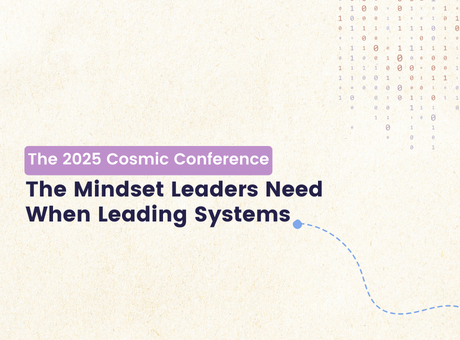10 Leadership Lessons from Ibraheem Sheerah, Chief Transformation Officer at Saudia Group
- Marilyn Zakhour
- Oct 24, 2025
- 4 min read
Updated: Nov 3, 2025
As part of this year’s Cosmic Conference in Riyadh, we had the honour of learning from Ibraheem Sheerah, Chief Transformation Officer at Saudia Group and one of the visionary leaders shaping the Kingdom’s future. In this unforgettable masterclass, he shared stories and insights from his journey leading large-scale transformation, from turning critics into builders to leading from the heart.
Our conversation with Ibraheem explored what it means to lead through systems at the scale of a nation, an organization, a team, and the self. Across these levels, his reflections revealed a consistent truth: lasting transformation is never the product of isolated effort, but of systems built with purpose, trust, and humanity.
Leadership Lessons from Ibraheem Sheerah
Here are 10 leadership lessons from Ibraheem that remind us that true transformation begins within. The systems we build in our organizations, teams, and selves define our legacy.

At the Organizational Level
1. Turn Critics into Builders
Instead of silencing critics, Ibraheem invited them to co-own the transformation. He booked amphitheatres in Jeddah and Riyadh and opened the doors to everyone: employees, customers, suppliers, and even the harshest critics. “I launched the sessions without permission from my boss, without approval from marketing. I invited them all,” he recalled. “Come to these sessions. Don’t complain. Help us change Saudia.” He shifted the narrative from dissent to dialogue, criticism to contribution, and blame to belonging. This approach proved that ownership and shared outcomes are the most powerful forms of transformation.
2. Think in Systems
“Every time I want to change something, I look at the 360 impact: what happens if I change it, and what happens if I don’t? If I move here, what might break there?” Systems leadership means seeing patterns, not just events. It involves understanding connections and interdependence. Every decision echoes across the organization.
3. Anchor Business in Purpose
Every role is temporary, but the mission endures. From his early career in defence and infrastructure to leading Saudi Airlines’ transformation, Ibraheem carried one constant belief: “Wherever I work, I feel it is my home, and I must protect and improve it.” His loyalty to purpose over position makes him not just a systems builder, but a nation builder. He often reminds his team: “We’re not just running an airline; we’re representing a nation.” Every choice, from service to strategy, is part of Saudi Arabia’s larger transformation.
4. To Fix the System, You Sometimes Have to Break the System
Real transformation begins when leaders stop patching symptoms and start challenging the system itself. Ibraheem described how, to rebuild Saudi Airlines’ foundations, he had to question inherited structures, unspoken norms, and outdated habits. “You can’t upgrade the system while you’re still operating inside its old rules,” he said. Breaking the system isn’t destruction; it’s courage. It’s the decision to pause what’s comfortable to make space for what’s possible.
5. One Hurts, and Everyone Feels
In the aviation ecosystem, everything is interconnected. “If one player hurts, everyone feels.” Airlines, airports, regulators, suppliers, and service partners all form one living ecosystem. A delay in one corner ripples across the network; a single weak link can ground the whole chain. His reminder was clear: national transformation demands collective accountability. The system wins when every player moves together, with shared purpose, trust, and care.
At the Team Level
6. Trust Before Control
Authority builds compliance; trust builds commitment. Empower people, stand by them when they stumble, and watch accountability grow. “If they make mistakes, I take the hit in front of His Excellency.”
7. Teach the Why, Not Just the What
Ibraheem doesn’t want followers; he wants thinkers. “I want them to question the status quo. I love many whys.” When people understand the ‘why’ behind their work, they no longer wait for direction. They act with ownership and creativity.
8. Treat Failure as a Sign of Life
When an admin confessed a costly mistake, Ibraheem’s response was to take him to lunch, not reprimand him. “One day we failed in four initiatives… and we celebrated.” Failure is not the opposite of success; it’s proof of learning. A system that never fails is one that has stopped growing.
At the Level of the Self
9. Lead from the Heart
No system can thrive if it forgets the human being at the centre of it. Leadership begins with humanity. Keep the door open, literally and figuratively. Know your people, their families, and their dreams. Authority can command effort, but only empathy can inspire commitment. For Ibraheem, leadership is a form of love and the courage to see greatness in others before they see it in themselves. “I manage them from the bottom of my heart,” he said of his team.
10. Change Begins Within
Ibraheem closed the masterclass with this Ayah: Indeed, Allah does not change the condition of a people until they change what is in themselves. In his words, you have to “Be the change the world is expecting you to be.” His message is clear: national transformation begins with inner transformation. Systems evolve when people do.
You can rewatch the full session here:



Comments